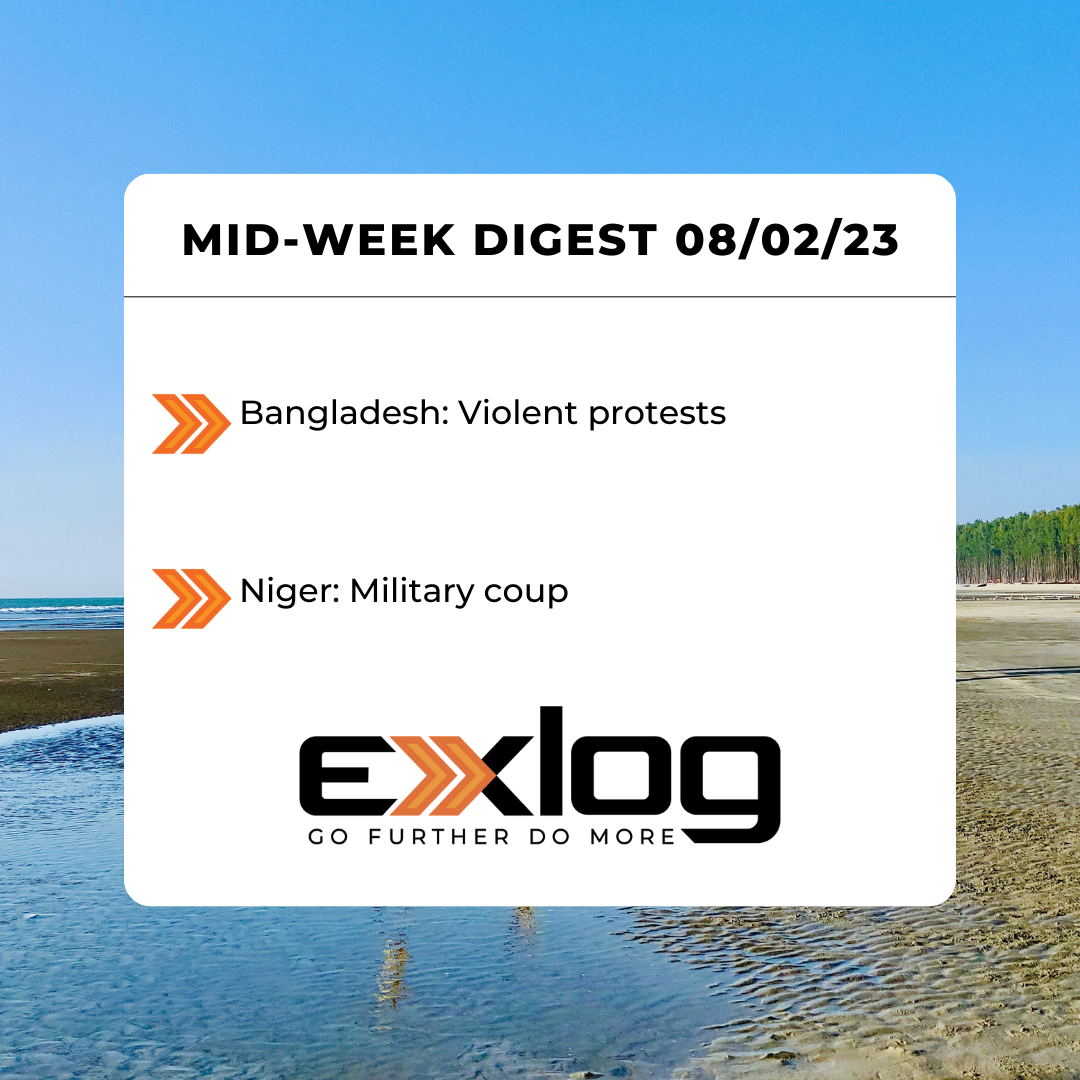Violent protests in Bangladesh and military coup in Niger
Bangladesh: Violent protests against government in Dhaka
Recent violent protests in Dhaka signal that further unrest is likely in the lead-up to the Bangladeshi national elections scheduled for early 2024. The protests began on July 28 as peaceful demonstrations, turning violent the following day. Approximately 8,000 security personnel deployed to Old Dhaka’s Naya Paltan area – where tens of thousands of protestors and leadership of the main opposition Bangladesh Nationalist Party (BNP) had gathered – to enforce security measures. The ruling Awami League (AL) party countered with a peaceful demonstration nearby. Protestors’ attempts to blockade at least four major roadways around Dhaka early July 29 led police to disperse the crowds using tear gas and rubber bullets; the situation escalated further when protesters retaliated by attacking police with bricks and sticks. More than 100 opposition activists and 20 police officers were injured during the unrest, and at least 124 protesters were arrested. Further peaceful protests took place in Naya Paltan on August 1 to condemn the detention of a BNP leader. Since 2022, BNP supporters have held a series of demonstrations demanding that current Prime Minister Hasina resign and that the January 2024 national elections take place under a neutral caretaker government. The BNP has accused Hasina of authoritarianism, human rights abuses, and vote rigging in the 2014 and 2018 elections. The US has intervened by sanctioning an elite security force and requesting a UN peacekeeping force to supervise the upcoming vote. While such international pressure and scrutiny could induce police to exercise greater restraint in their use of force against demonstrators, further unrest – including clashes between rival political supporters – remains likely leading up to the January 2024 elections.
Niger: Military junta seizes power, triggers unrest and evacuations
A faction of the Nigerien Army ousted President Mohamed Bazoum on July 26 and assumed leadership of the country under the newly formed National Council for the Protection of the Fatherland (CNSP), triggering unrest, overland and air travel disruptions, and evacuation of European nationals. Coup leaders imposed a nationwide overnight curfew, closed the country’s borders, and suspended the constitution. Land and air borders with Algeria, Burkina Faso, Mali, Libya, and Chad reopened on Aug. 1, although a 0000-0500 nationwide curfew remains in place. According to a NOTAM issued on Aug. 2, Nigerien airspace and the airports in Niamey (NIM), Agadez (AJY), and Zinder (ZND) remain closed, with the exception of flights to or from the five neighboring countries listed above. Hundreds of pro-government demonstrators briefly protested in the streets of Niamey to demand Bazoum’s release immediately following the coup but were violently dispersed by security forces. A group of military junta supporters also held violent anti-French protests and attacked the French Embassy in Niamey on July 31, prompting several European nations – including France, Italy, and Spain – to organize evacuation flights from the capital. The Economic Community of West African States (ECOWAS) issued a warning on July 31, threatening to intervene militarily if the junta failed to reinstate the president within one week, and imposed travel bans and financial sanctions on the military officials involved in the coup. The cities of Niamey, Maradi, and Zinder reported power outages on Aug. 1, allegedly caused by Nigeria cutting off supplies to Niger’s electricity company, Nigelec; however, it remains unclear if any such suspension is a part of the formal ECOWAS sanctions package. In response to the ECOWAS statement, Mali and Burkina Faso – themselves ruled by military governments that seized power in coups – vowed to join forces to defend Niger against foreign intervention. Russia’s Wagner Group has also supported the takeover and offered military assistance, raising concerns of increasing Russian influence in the Sahel following the French troop withdrawal from Mali and Burkina Faso. The likelihood of an armed conflict between military factions in Niger is low following an official July 27 statement by the Army that it would not challenge the junta. However, political instability is likely to persist in the short term, and tensions between pro-Bazoum and pro-coup supporters are possible, particularly ahead of the ECOWAS-imposed deadline to reinstate civilian leadership.


